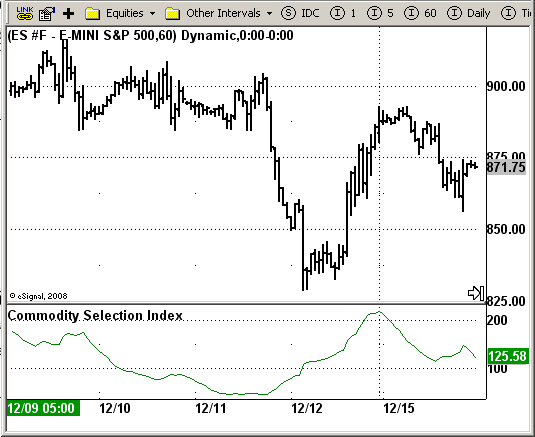File Name: CSI.efs
Description:
Commodity Selection Index
Formula Parameters:
PointValue: 50
Margin : 3000
Commission: 10
Length : 14
Notes:
The Commodity Selection Index ("CSI") is a momentum indicator. It was
developed by Welles Wilder and is presented in his book New Concepts in
Technical Trading Systems. The name of the index reflects its primary purpose.
That is, to help select commodities suitable for short-term trading.
A high CSI rating indicates that the commodity has strong trending and volatility
characteristics. The trending characteristics are brought out by the Directional
Movement factor in the calculation--the volatility characteristic by the Average
True Range factor.
Wilder's approach is to trade commodities with high CSI values (relative to other
commodities). Because these commodities are highly volatile, they have the potential
to make the "most money in the shortest period of time." High CSI values imply
trending characteristics which make it easier to trade the security.
The Commodity Selection Index is designed for short-term traders who can handle
the risks associated with highly volatile markets.
Download File:
CSI.efs

EFS Code:
Description:
Commodity Selection Index
Formula Parameters:
PointValue: 50
Margin : 3000
Commission: 10
Length : 14
Notes:
The Commodity Selection Index ("CSI") is a momentum indicator. It was
developed by Welles Wilder and is presented in his book New Concepts in
Technical Trading Systems. The name of the index reflects its primary purpose.
That is, to help select commodities suitable for short-term trading.
A high CSI rating indicates that the commodity has strong trending and volatility
characteristics. The trending characteristics are brought out by the Directional
Movement factor in the calculation--the volatility characteristic by the Average
True Range factor.
Wilder's approach is to trade commodities with high CSI values (relative to other
commodities). Because these commodities are highly volatile, they have the potential
to make the "most money in the shortest period of time." High CSI values imply
trending characteristics which make it easier to trade the security.
The Commodity Selection Index is designed for short-term traders who can handle
the risks associated with highly volatile markets.
Download File:
CSI.efs

EFS Code:
PHP Code:
/*********************************
Provided By:
eSignal (Copyright c eSignal), a division of Interactive Data
Corporation. 2008. All rights reserved. This sample eSignal
Formula Script (EFS) is for educational purposes only and may be
modified and saved under a new file name. eSignal is not responsible
for the functionality once modified. eSignal reserves the right
to modify and overwrite this EFS file with each new release.
Description:
Commodity Selection Index
Version: 1.0 12/15/2008
Formula Parameters: Default:
PointValue 50
Margin 3000
Commission 10
Length 14
Notes:
The Commodity Selection Index ("CSI") is a momentum indicator. It was
developed by Welles Wilder and is presented in his book New Concepts in
Technical Trading Systems. The name of the index reflects its primary purpose.
That is, to help select commodities suitable for short-term trading.
A high CSI rating indicates that the commodity has strong trending and volatility
characteristics. The trending characteristics are brought out by the Directional
Movement factor in the calculation--the volatility characteristic by the Average
True Range factor.
Wilder's approach is to trade commodities with high CSI values (relative to other
commodities). Because these commodities are highly volatile, they have the potential
to make the "most money in the shortest period of time." High CSI values imply
trending characteristics which make it easier to trade the security.
The Commodity Selection Index is designed for short-term traders who can handle
the risks associated with highly volatile markets.
**********************************/
var fpArray = new Array();
var bInit = false;
function preMain() {
setStudyTitle("Commodity Selection Index");
setCursorLabelName("CSI", 0);
setDefaultBarFgColor(Color.green, 0);
var x=0;
fpArray[x] = new FunctionParameter("PointValue", FunctionParameter.NUMBER);
with(fpArray[x++]){
setLowerLimit(1);
setDefault(50);
}
fpArray[x] = new FunctionParameter("Margin", FunctionParameter.NUMBER);
with(fpArray[x++]){
setLowerLimit(1);
setDefault(3000);
}
fpArray[x] = new FunctionParameter("Commission", FunctionParameter.NUMBER);
with(fpArray[x++]){
setLowerLimit(1);
setDefault(10);
}
fpArray[x] = new FunctionParameter("Length", FunctionParameter.NUMBER);
with(fpArray[x++]){
setLowerLimit(1);
setDefault(14);
}
}
var xATR = null;
var xADX = null;
var xCSI = null;
function main(PointValue, Margin, Commission, Length){
var nState = getBarState();
if (nState == BARSTATE_ALLBARS) {
if (PointValue==null) PointValue = 50;
if (Margin==null) Margin = 3000;
if (Commission==null) Commission = 10;
if (Length==null) Length = 14;
}
var K = 100 * ((PointValue / Math.sqrt(Margin) / (150 + Commission)));
if(bInit==false){
xATR = atr(Length);
xADX = adx(Length, Length);
xCSI = efsInternal("calcCSI", K, Length, xATR, xADX)
bInit = true;
}
if (getCurrentBarCount() < Length) return;
return xCSI.getValue(0);
}
function calcCSI(K, Length, xATR, xADXR){
if (xADXR.getValue(-Length) == null) return;
var nADXR = (xADXR.getValue(0) + xADXR.getValue(-Length)) * 0.5;
var nCSI = K * xATR.getValue(0) * nADXR;
return nCSI;
}